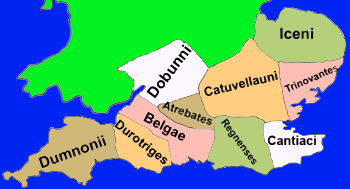Regini
| Regnenses | |
|---|---|
 |
|
| Geography | |
| Capital | Noviomagus Reginorum (Chichester) |
| Location |
Sussex Hampshire |
| Rulers | Tiberius Claudius Cogidubnus |
The Regnenses, Regni or Regini were a British Celtic kingdom and later a civitas of Roman Britain. Their capital was Noviomagus Reginorum, known today as Chichester in modern West Sussex.
Before the Roman conquest their land and capital appear to have been part of the territory of the Atrebates, possibly as part of a confederation of tribes. It has been suggested that, after the first phase of the conquest, the Romans maintained the Atrebates as a nominally independent client kingdom, acting as a buffer between the Roman province in the east and the unconquered tribes to the west. The ruler of the kingdom was Tiberius Claudius Cogidubnus: Tacitus says "quaedam civitates Cogidumno regi donatae (certain civitates were given to King Cogidubnus)" and remarks on his loyalty. A 1st century inscription found in Chichester supplies his Latin names, indicating he was given Roman citizenship by Claudius or Nero. Cogidubnus may have been a relative of Verica, the Atrebatian king whose overthrow was the excuse for the conquest. After Cogidubnus's death, the kingdom would have been incorporated into the directly ruled Roman province and divided into several civitates, including the Atrebates, Belgae, and Regnenses. (interpreted as Latin "people of the kingdom").
The name Regnenses has been read as a Latin word, interpreted as "people of the kingdom" (that is, the client kingdom, rather than the territories ruled directly by Roman officials). This is a historical hypothesis, and depends on reconstructing the name of the civitas as Regnenses; that is far from certain, as many linguists favour a native Regni or Regini. "Even the reading of the genitive plural tribe name in [the Ravenna Cosmography] as Regnentium is a tendentious emadation ... To go further and turn all this into Regnenses, 'The People of the Kingdom', is more than rash ... The tribal name in Ptolemy is Regnoi, Rignoi, or Reginoi ... It is proposed ... that this was British Regini" (Jackson 1970). "This is surely right" (Rivet & Smith 1979).
...
Wikipedia
